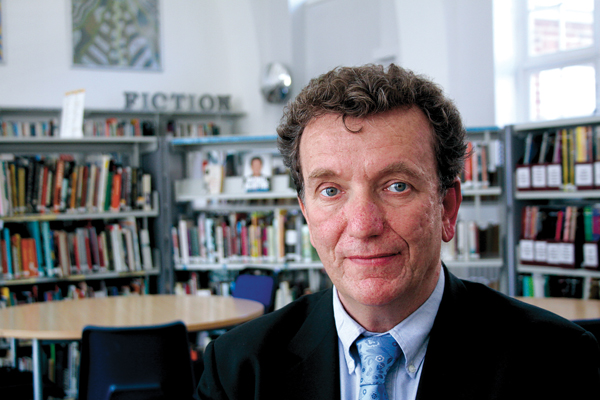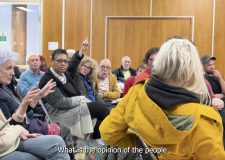IPads for every student at Hove Park School
Derek Trimmer’s prescription for his school has brought dramatic change. Now he wants every pupil to have an iPad.
Frank le Duc learns more

In three weeks Hove Park School will start handing out iPads for all pupils to use in lessons. Within six weeks most of the 1,600 children at the school will have the tablet computers in class and will be able to take them home.
Only students who are due to leave at the end of next term will not be part of the scheme. The school is the first in Brighton and Hove to equip all its pupils in this way.
Head teacher Derek Trimmer said: “It’s about transforming learning.” He said that the iPads would allow more individualised learning and feedback and greater creativity. And he added that, while he wanted the parents of every pupil to make a contribution towards the minimum £209 cost, no one would be left behind.
He expects a bit of grumbling, just as there was when he brought in a new school uniform. He said: “There will be some complaints. We went through this with the uniforms. We had about 14 complaints on the uniforms. It seemed like a big thing at the time.” The dust settled, he said, and most pupils and parents now seemed to accept the change.
With 450 children – more than a quarter – being eligible for free schools meals, or having been eligible within the past six years, he said that he had been mindful of the cost. The school tested different devices and used a competitive tendering process before settling on the Apple iPads and iPad Minis. And it was able to bulk buy, obtaining a hefty discount.
Mr Trimmer said that Brighton and Hove City Council had provided practical and financial support for the project. The aim was to “establish the project as a model for other schools”. A number of schools were trying similar schemes, such as Warden Park in Cuckfield, but only a few across the country had done it throughout the whole school.
A small group of teachers and pupils have already been trying out the technology. Deputy head Niel McLeod, the school’s business manager, said that the feedback was excellent. He said that children learning with iPads showed improvements in achievement, engagement and attendance. He added: “And it’s reduced photocopying!”
Raising grades
While Mr McLeod is the man with an eye on the school budget, it is the improvements in learning that have made him and Mr Trimmer so enthusiastic about the iPad project. After all, when Mr Trimmer took over as head in May 2011 the school was performing poorly. Exam results were way behind Blatchington Mill, which nominally shares a catchment area. Grades have soared since then.
He told parents, pupils and guests at the school’s recent prizegiving evening at Hove Town Hall: “The percentage of students at Hove Park achieving the gold standard of five or more A* to C including English and maths has risen from 27 per cent in 2009 to 41 per cent in 2010, 44 per cent in 2011 and 61 per cent in 2012.
“We are currently on track with this year’s cohort to break through the 70 per cent threshold. However, we still have ambitions to exceed that figure with our current year 10 and we are aiming for 80 per cent or more of students achieving this measure of success in 2014.”
His office walls are covered with detailed performance information, including a clear at-a-glance guide to the progress of those preparing for exams. Mr Trimmer said: “When a school is in trouble, it’s not often it’s the kids’ fault. There have been a lot of challenges here. But it really is shifting. Everyone wanted it to shift. Now, I want to look ahead.”
Hove Park is the most improved secondary school in Brighton and Hove. Mr Trimmer said: “To get to that point where no child fails, we’ve got to do something different.” That, he said, was where the iPads came in.
Catch Blatch
His approach has paid dividends outside the exams hall too. Ofsted, the official schools watchdog, sent five inspectors into the school over two days early last month. In their report earlier this month they rated the school as good – the second highest out of four grades and one below outstanding. Their verdict was up one grade from satisfactory when it last had a full inspection three years ago.
In his previous job at Mayfield in Portsmouth, Mr Trimmer inherited a school in special measures – Ofsted’s regime for the worst performing schools. It was judged to be satisfactory when next inspected. He previously taught in Croydon, having started his career as a social worker dealing with violent children.
He said: “I developed a bit of a specialism for troubled schools. I think we’ve got a formula here that works and I’d like us to do our bit for the city.” He added: “Morale is great.” And he gave a very human illustration. After making the point to staff about sharing a catchment area with Blatchington Mill but having poorer exam results, he found that someone had put up posters to spur on colleagues which said: “Catch Blatch!”
Challenging perceptions
He makes no bones about his aim of placing Hove Park at the “forefront of school improvement” in Brighton and Hove. He said: “This means raising the aspirations, expectations and achievement for all students in order to make a major contribution to the development of educational excellence across the city. Central to achieving high levels of achievement are a positive ethos, good behaviour and hard work.”
The school will continue to specialise in modern foreign languages, including Mandarin Chinese. He confessed that he couldn’t really claim to have mastered any other languages himself although he had had French lessons. His wife is Spanish but they speak English at home. He added: “I went to university in Newcastle. I can speak a bit of Geordie!”
His humour and his ambition for his students are evident. In his previous headship his other qualities were tested when a Kurdish Syrian girl at his school was threatened with deportation. He went to the deportation centre to visit her where he was strip-searched. The girl, Lorin Sulaiman, and her family were released while they waited for their case to be heard. But it was on condition that they lived with Mr Trimmer.
He said: “She was wonderful and so was her sister. Her father had been killed and her mother had been tortured. She’d had a hard time.”
A campaign at the school and in the local area gathered force. He said that it had a galvanising effect, giving people a common purpose and challenging a number of people’s negative perceptions.
“I got some death threats,” he said. “But all the kids really wanted to know was what it was like living with Mr Trimmer! It was something that brought the whole school together. She was allowed to stay. She did well I her exams and she’s just finished university. She did law. And now she’s defending people who are in a similar position.”
Lorin’s case required the sort of leadership that people look to a head teacher to provide. He regards his job as inspiring not just his students but also his staff. And he believes that he has the privilege of teaching teachers and training the next generation of leaders in our schools. So it wasn’t really a surprise when he shrugged off niggles and doubts about the iPad project and said: “We don’t know all the answers but we will make this work.”
Brighton & Hove City Council leader Jason Kitcat on the work of the Empty Property team
Together with Lewes, we’ve jointly won £900,000 of government funding to bring 60 long-term empty properties back into use over the next three years. This will add to the 150 properties Brighton & Hove City Council already brings back into use every year through the work of our Empty Property team.
There are a variety of reasons why, despite a shortage of housing in the city, some homes become and stay empty for so long. We have a programme in place to renovate and fill council-owned empty properties, which will see scores of properties become available for those on the local waiting list.
However the majority of empty properties in the city are privately-owned. Their owners often aren’t based in Brighton & Hove, and aren’t always aware of the negative effects their empty properties are having on local communities.
To tackle this, our Empty Property team proactively identifies empty properties and contacts the owners to offer advice to encourage them to bring empty homes back into use. As a last resort, we are able to take enforcement action against owners who won’t take responsibility for their properties.
We also recently created extra financial incentives for owners to fill empty properties, and landlords to get on with any work that’s needed – by abolishing the discount on council tax for those who own second homes in the city, and shortening the period that houses that are being refurbished are exempt from council tax. Both of these measures will help bring empty homes back onto the market for one of the many households who need a home.
Making empty homes fit for purpose and filling them makes sense for landlords, local communities and the council. We hope that with this extra funding we’ll be able to return many more to use as quickly as possible.




















